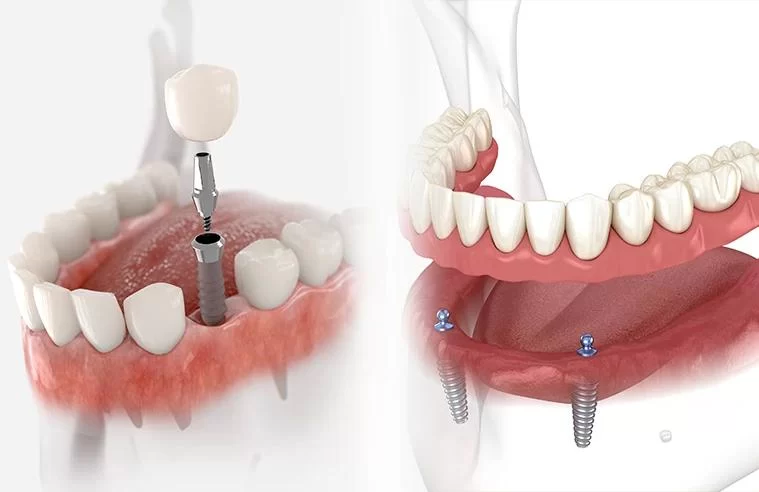
The Cost of Dental Implants Versus Dentures: Which is the Better Option for You?
When it comes to replacing missing teeth, the two most common solutions are dental implants and dentures. Both have their unique benefits and drawbacks, and when deciding between the two, the cost is a significant factor that many people consider. But how do these two dental options compare in terms of cost, longevity, and overall value? This article will dive deep into the cost differences between dental implants and dentures, and provide insight on what factors to consider when choosing the right dental solution for you.
1. Understanding Dental Implants
Dental implants are titanium posts surgically placed into the jawbone to replace the roots of missing teeth. A crown or bridge is then placed on top of the implant, providing a strong, permanent solution for missing teeth. The process of getting dental implants typically involves multiple steps, including the initial consultation, surgery, healing time, and the placement of the permanent crown. While the upfront cost of dental implants can be high, they are known for their durability and long lifespan.
2. The Procedure and Cost of Dental Implants
On average, dental implants can cost anywhere between $3,000 to $4,500 per tooth, though this price can vary depending on the location, the complexity of the procedure, and the dentist's expertise. Additional costs may include the consultation fee, diagnostic tests (such as X-rays or CT scans), and any necessary bone grafts for patients with insufficient bone structure. While the initial investment may seem steep, dental implants are known to last a lifetime if properly cared for, which makes them a cost-effective option in the long run.
3. Understanding Dentures
Dentures are removable dental appliances that are designed to replace missing teeth. Unlike dental implants, dentures do not require surgery. They come in two main types: full dentures, which replace all of the teeth in either the upper or lower jaw, and partial dentures, which fill in gaps when some natural teeth remain. Dentures are a popular choice for people who may not be suitable candidates for implants due to age or health conditions.
4. The Procedure and Cost of Dentures
The cost of dentures varies widely depending on the type (full or partial), the materials used, and the complexity of the customization. On average, a set of dentures can cost between $1,000 and $3,000. This price usually includes the fitting and the necessary follow-up visits to ensure the dentures fit properly. However, dentures are not as long-lasting as implants, and may need to be replaced or adjusted over time due to wear and tear. Unlike implants, dentures need to be removed for cleaning and maintenance, which adds to their overall cost over the years.
5. Durability and Longevity: Implants vs. Dentures
One of the major differences between dental implants and dentures is their durability. Dental implants are designed to be a permanent solution. With proper care, they can last a lifetime, providing a strong and natural-feeling replacement for missing teeth. In contrast, dentures have a shorter lifespan and may need to be replaced every 5 to 10 years. The materials used in dentures are not as durable as those used in implants, which means they can wear down and lose their shape over time.
6. Lifestyle Considerations
While both dental implants and dentures serve the same function—replacing missing teeth—implants provide a more natural look and feel. Implants are embedded in the jawbone, which allows them to function like natural teeth, providing a stable and comfortable fit. Dentures, on the other hand, can sometimes shift or slip, especially while eating or speaking, which can be uncomfortable for some users. Additionally, dentures may require adhesive to stay in place, which can be a hassle for some patients.
7. Benefits of Choosing Dental Implants
The main advantage of dental implants is their long-term durability. They act as a permanent solution, with no need for future replacements or adjustments. Implants also help preserve the integrity of the jawbone, as they stimulate bone growth and prevent bone loss, which is common after losing teeth. Furthermore, implants are easier to maintain since they don’t require removal for cleaning. Patients with dental implants also report a higher level of satisfaction with their appearance, as the implants look and feel just like natural teeth.
8. Benefits of Choosing Dentures
Dentures, while not as durable as implants, are a more affordable option for those who may be on a budget. They are a non-invasive treatment, making them ideal for individuals who cannot undergo surgery or who have significant health concerns. Additionally, dentures are easy to adjust and replace, and there is no need for a lengthy recovery period. For many people, dentures provide a functional and aesthetically pleasing solution for missing teeth at a lower upfront cost.
9. The Impact on Overall Health
While both dental implants and dentures improve oral health by restoring functionality, dental implants are better at preventing bone loss and supporting overall oral health. Without teeth or implants, the jawbone can deteriorate over time, leading to changes in facial structure and the need for further dental work. Dentures, while helpful, do not prevent bone loss in the same way that implants do, which means the jawbone may continue to deteriorate after teeth are lost.
10. Final Thoughts: Which Option is Right for You?
Choosing between dental implants and dentures depends on your budget, your dental health, and your long-term goals. If you're looking for a permanent, low-maintenance solution and are willing to invest more upfront, dental implants may be the better choice. However, if you're looking for a more affordable, temporary option and are not concerned with the maintenance and longevity, dentures may suit your needs. It's important to consult with your dentist to determine which option is best based on your individual circumstances.







 Yonkers Dental Implants Center4.0 (63 review)
Yonkers Dental Implants Center4.0 (63 review) My New Smile Dental5.0 (231 review)
My New Smile Dental5.0 (231 review) EZ Dental5.0 (53 review)
EZ Dental5.0 (53 review) Parlor Dental5.0 (27 review)
Parlor Dental5.0 (27 review) Sila Dental - San Juan Capistrano5.0 (148 review)
Sila Dental - San Juan Capistrano5.0 (148 review) Aspen Dental - State College, PA3.0 (637 review)
Aspen Dental - State College, PA3.0 (637 review) The Importance of Oral Health Education During Pregnancy for a Healthy Pregnancy
The Importance of Oral Health Education During Pregnancy for a Healthy Pregnancy Best Tips for Brushing Your Teeth Properly for Healthy Gums: Essential Techniques for Oral Health
Best Tips for Brushing Your Teeth Properly for Healthy Gums: Essential Techniques for Oral Health Why Skipping Dental Checkups Can Lead to Bigger Oral Health Problems
Why Skipping Dental Checkups Can Lead to Bigger Oral Health Problems Advantages of Porcelain Dental Restorations
Advantages of Porcelain Dental Restorations How Can Diabetes Cause Tooth and Gum Problems? Preventing and Managing Oral Health Issues
How Can Diabetes Cause Tooth and Gum Problems? Preventing and Managing Oral Health Issues Healthy Habits for Promoting Good Oral Health and Hygiene: Tips for a Healthy Smile
Healthy Habits for Promoting Good Oral Health and Hygiene: Tips for a Healthy Smile